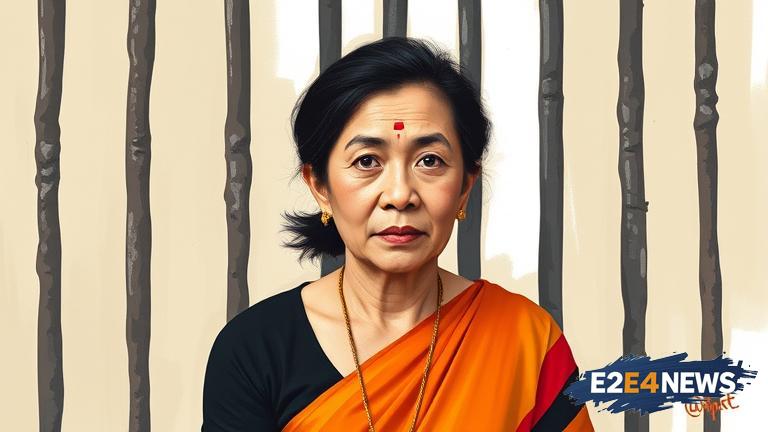A Thai woman, who was sentenced to 43 years in prison for insulting the monarchy, is set to be released from prison after a significant reduction in her sentence. The woman, whose name has not been disclosed, was found guilty of violating Thailand’s strict lese-majeste laws, which prohibit any form of insult or disrespect towards the royal family. The laws are considered to be among the strictest in the world and have been widely criticized by human rights groups. The woman’s sentence was initially set at 87 years, but it was later reduced to 43 years due to her cooperation with the authorities. The reduction in sentence is a significant development in the case, which has drawn widespread attention and criticism from human rights groups. The woman’s imprisonment has been seen as a symbol of the Thai government’s strict enforcement of the lese-majeste laws, which have been used to silence critics and opponents of the monarchy. The laws have been criticized for being overly broad and vague, allowing for the prosecution of individuals for even minor offenses. The woman’s case has also highlighted the issue of freedom of speech in Thailand, where individuals are often reluctant to express their opinions or criticize the government or monarchy due to fear of prosecution. The Thai government has defended the lese-majeste laws, saying that they are necessary to protect the monarchy and maintain social order. However, human rights groups have argued that the laws are being used to suppress dissent and stifle free speech. The woman’s release from prison is expected to be seen as a positive development by human rights groups, who have been campaigning for her freedom. The case has also sparked debate about the role of the monarchy in Thai society and the need for greater freedom of speech and expression. The Thai government has faced criticism for its handling of the case, with many arguing that the sentence was excessive and disproportionate to the offense. The woman’s imprisonment has also had a significant impact on her family and loved ones, who have been campaigning for her release. The case has also highlighted the issue of prison conditions in Thailand, where inmates often face overcrowding, poor sanitation, and limited access to medical care. The woman’s release is expected to be a significant relief to her family and loved ones, who have been waiting for her freedom for many years. The case has also sparked calls for greater reform of the lese-majeste laws, which are seen as outdated and overly restrictive. The Thai government has faced pressure from human rights groups and the international community to reform the laws and ensure greater freedom of speech and expression. The woman’s release from prison is a significant step towards greater freedom and justice in Thailand, but much work remains to be done to address the underlying issues. The case has also highlighted the importance of a free and independent media, which is essential for holding those in power to account and promoting transparency and accountability. The Thai government has faced criticism for its handling of the media, with many arguing that it is too restrictive and limiting. The woman’s release from prison is a significant development in the case, and it is expected to be seen as a positive step towards greater freedom and justice in Thailand. The case has also sparked debate about the role of the judiciary in Thai society, with many arguing that it is too closely tied to the government and the monarchy. The woman’s release from prison is expected to be a significant relief to her family and loved ones, and it is a step towards greater freedom and justice in Thailand.
